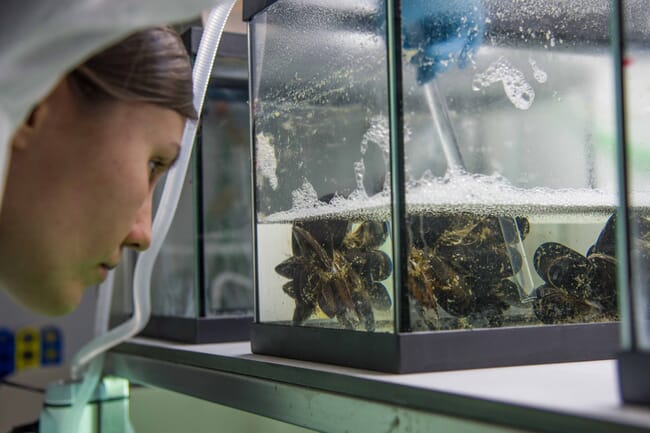
Researchers are exploring the potential impact of nanoparticles in marine ecosystems and aquaculture © NANOCULTURE Project
The ground-breaking NANOCULTURE Project includes studies that focus on aquatic ecosystems related to aquaculture in the Atlantic area. Researchers are specifically targeting organisms destined for human consumption including cultured fish, molluscs, seaweed and sea urchins.
The international collaboration has involved multiple research institutions across Spain, the UK and France. The project’s final results are being unveiled in a series of English, Portuguese and Spanish language webinars on 24, 25 and 27 October respectively.
Project coordinator Begoña Espiña said the online seminars will divulge knowledge about a relatively unknown subject to global audiences in a bid to drive improvements and sustainability for the fast-growing sector.
“In recent years nanoparticles have been increasingly used across a diverse range of industrial applications,” said Ms Espiña. “However, limited scientific research has been conducted to assess the toxicity of nanoparticles, and the potential knock-on effect to the human system. Given the importance of the aquaculture sector for the Atlantic Area, the NANOCULTURE research group has set about extensive studies. This will enable us to better understand possible adverse effects and in turn improve the safety of future food production and any environmental-related impacts of the activity.”
The NANOCULTURE project has brought together world leading aquaculture professionals, analytical chemists, physical chemists and molecular biologists. Working in collaboration they have developed sensors to detect the presence of engineered metallic nanoparticles in aquaculture. These sensors are able to monitor the levels of exposure to nanoparticles in seawater across aquaculture specimens, in order to assess their impact on human intake.
“We look forward to embarking on the next phase of the NANOCULTURE project, involving open discourse with industry colleagues to explain the key findings of our studies,” added Ms Espiña. “The online webinar series is being hosted by key partners, and staged in a variety of languages, to maximise accessibility and broaden the reach of our communication. We invite all interest parties to register at the earliest convenience."
English-language session – 24 October 14:00 and 15:30 (London/Lisbon time) - Hosted by Indigo Rock Marine Station
- Welcome: Julie Maguire, Indigo Rock Marine Station
- Meeting Global Regulations for Nanomaterials - Invited speaker Sean Kelly, from Nanotechnologies Industry Association (NIA)
- Final results of NANOCULTURE – Begoña Espiña (INL)
Portuguese-language session – 25 October 14:00 – 15:30 (London/Lisbon time) - Hosted by CIIMAR
- 14:00 Abertura do evento, Alexandre Campos (CIIMAR)
- 14:05 S2AQUA –Laboratório Colaborativo, Pedro Pousão-Ferreira (orador convidado) Director S2AQUA; Estação Piloto de Piscicultura de Olhão, IPMA
- 14:25 Apresentação do projeto NANOCULTURE, Alexandre Campos (CIIMAR)
- 14:35 Efeitos das nanopartículas em espécies de aquacultura, Mário Araújo (CIIMAR)
- 14:50 Estudos de caso e biossensores para nanopartículas, Begoña Espiña (INL)
Spanish-speaking session – 27 October 14:00 – 15:30 (Madrid time) - Hosted by CETGA and USC
- Invited speaker: Garazi Rodríguez, APROMAR, “Importancia del sector acuícola en España y Europa”




